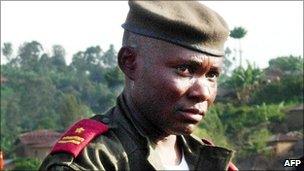DR Congo army mining interests 'worsens conflict'
- Published

Gen Amisi is second in command of the Congolese army
Criminal networks in the army are an important cause of insecurity and conflict in the east of the Democratic Republic of Congo, UN experts say.
In a report, the UN names top army commanders allegedly involved in the illegal mineral trade, including land forces chief of staff Gen Amisi Kumba.
The report says there is evidence of illegal taxation and protection rackets as well as indirect commercial control.
It says this has prevented the army from pursuing armed groups.
The lure of profits from mines in eastern DR Congo has turned the area into a battlefield, says the BBC's Thomas Fessy.
Rebels target civilians in the surrounding villages near the border with Rwanda and Uganda and there have been reports of kidnapping, massacres and mass rapes, fuelled by the profits from minerals.
DR Congo is rich in minerals such as gold and diamonds, as well as minerals such as coltan, used to make mobile phones, but after years of conflict and misrule, most of its people live in poverty.
The country - two-thirds the size of Western Europe - has hardly any tarmac roads between its major cities, so ordinary people use the River Congo and its tributaries to travel around.
Government inquiry
Two regional commanders in eastern DR Congo are also said to be directly involved in mining activities, one of whom is accused of supplying money, weapons and uniforms to a local armed group.
This type of collusion with armed groups has worsened security in the region, according to the report.
Congolese Information Minister Lambert Mende told the BBC that a government inquiry had been opened after the BBC investigation on Gen Amisi was broadcast earlier this month.
He welcomed any more information, as provided by the UN report, which can help identify individuals involved in illegal activities.
The BBC found evidence that Gen Amisi installed a mining firm at the Omate mine in return for a 25% cut.
Following a mining ban in September, production is continuing at the mine under direct military control.
The general refused to answer questions about his role and the firm involved, Geminaco, denies there was a deal.